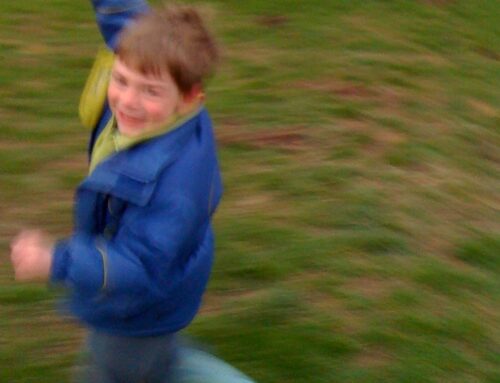It all happened so unexpectedly.
I was in the studio for the radio show Foodie and the Beast, and had brought my 8 year old son Linus along for the experience. When the show’s co-host, Dave Nellis, lightheartedly suggested that my son answer a few questions live on the air, it certainly seemed harmless enough. Here’s what happened next:

The apple, as they say, doesn’t fall far from the tree. Although I’m a livestock farmer, I only eat meat I raise myself; otherwise, I keep a strict vegetarian diet.
Dave: “So, your dad tells me you want to be a farmer when you grow up.”
Linus: “Yes. But when I run the farm, I’ll do things a little differently. Instead of raising animals for meat, I’ll have a petting zoo and a wildlife preserve.”
Dave (eyebrows raised): “Wow, that’s certainly a different direction. Dad, what do you think about that?”
(Before I can reply, Linus chimes back in): “And I’ll raise the cows for milk, and make cheese. And I want to raise black tailed deer, too. But not for eating. For people to come look at.”
Dave: “My goodness. Is there anything that you’ll do the same way?”
Linus: “Yes, I’ll keep the laying hens, for eggs. And the sheep, too. But just for their wool.”
Dave: “You certainly have it all planned out! So tell me dad, what’re your thoughts on all this?”
What were my thoughts? Part of me felt like the father of Billy Elliot in this scene:
As a farmer who sells bacon and lamb chops for a living, what could I say to a son who’s having vegetarian inclinations? For that matter, what could a British coal miner possibly say to a son interested in the ballet? As it turns out (in the movie as well as in real life) it’s actually easier than one might think.
You see, before I became an organic livestock farmer, I was vegetarian for several years myself. The farming methods I employ were greatly influenced by confinement animals feedlots (CAFOs) that I visited as a child. When I began farming in my early twenties, I resolved that if I ever raised animals on our farm, I would raise them on pasture, in a free-range environment, without antibiotics or hormone supplements. In short, our farm would provide an honest alternative to confinement, grain-fed, chemical-residue meat.
Fast forward seventeen years. As I sat in the studio listening, I heard my own voice echoed by my son, notes of compassion and consideration as he navigated the same path I had travelled. After struggling with these issues for many years, I could certainly understand a reluctance for raising animals for slaughter. Ultimately, it was the knowledge that my customers genuinely cared how our animals were raised that clarified my own position.
Don’t get me wrong, though. Despite my organic production methods, I fully understand that some people will never eat meat. For many, vegetarianism is akin to religious beliefs, where matters of faith are nothing short of incontrovertible. But it’s through respecting both sides that we can elevate our understanding for one another’s food choices. And while we’re at it, we might actually influence farming practices across the country in a positive way.
So to parents with children who suddenly announce they’re giving up meat, here’s some advice from a dad, a livestock farmer, and a former vegetarian.
1) Support them
After all, your kids look to you for guidance. This is the perfect time to have a meaningful conversation, perhaps one of the first grown up talks you’ll have. Discussing the ‘birds and the beeves’ might actually be easier than talking about the ‘birds and the bees.’
It’s also an opportunity to divert your food budget away from inhumane and unsustainable factory farming practices. After recently speaking along side Paul Shapiro, Vice President of Farm Animal Protection with the National Humane Society, I’m convinced that even small changes such as ‘Meatless Mondays’ can send a powerful message to confinement livestock operations across the country. Consumer choices drive our economy, and the empathy your child is feeling could genuinely affect future farming.
2) Educate them
Like most things in life, food is far from a black and white issue. There are now thousands of family farms like ours that raise animals 100% on pasture, with no confinement or chemicals whatsoever. While this type of agriculture might not persuade all vegetarians, I know from two decades of farmers’ market experience that having a free-range option certainly appeals to many consumers’ core beliefs.
If you value these types of practices, and want to see more farmers raising their animals this way, then educate your family about your options. Best of all, the vast majority of these farms love visitors, providing a perfect weekend field trip for you and your kids.
3) Eat with them
Plan a menu. Visit the farmers’ market, and cook a family dinner together. When was the last time you cooked a vegetarian lasagna with your kids? How about preparing something as simple (and delicious) as a green smoothie for breakfast?
While you’re at market, ask your producers about their growing practices. Just as not all animals are raised the same way, the same certainly holds true for fruits and vegetables. Shop with your kids, get to know your farmer, and you’ll appreciate that amazing meal all the better.
● ● ● ● ●











Leave a Reply